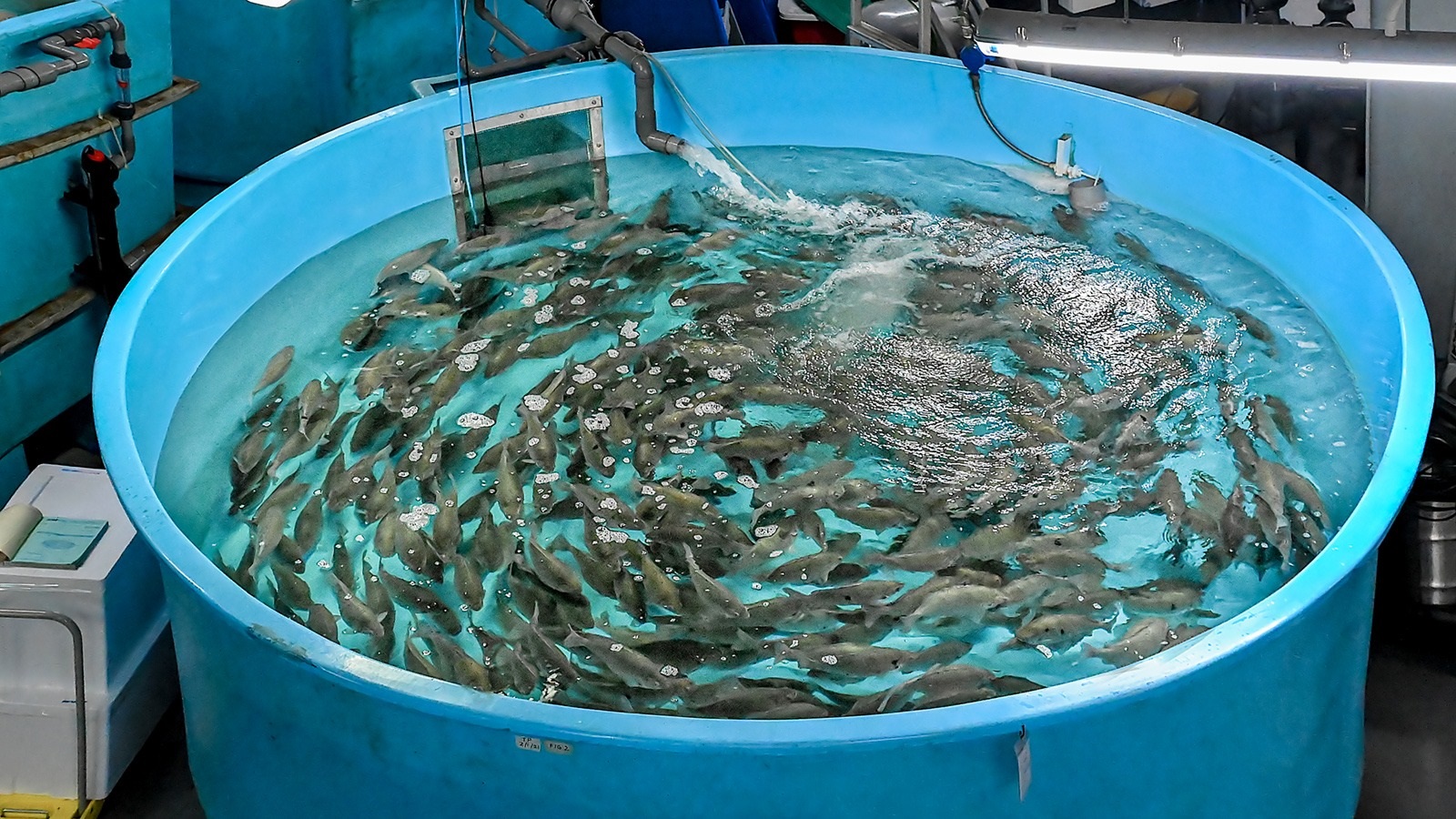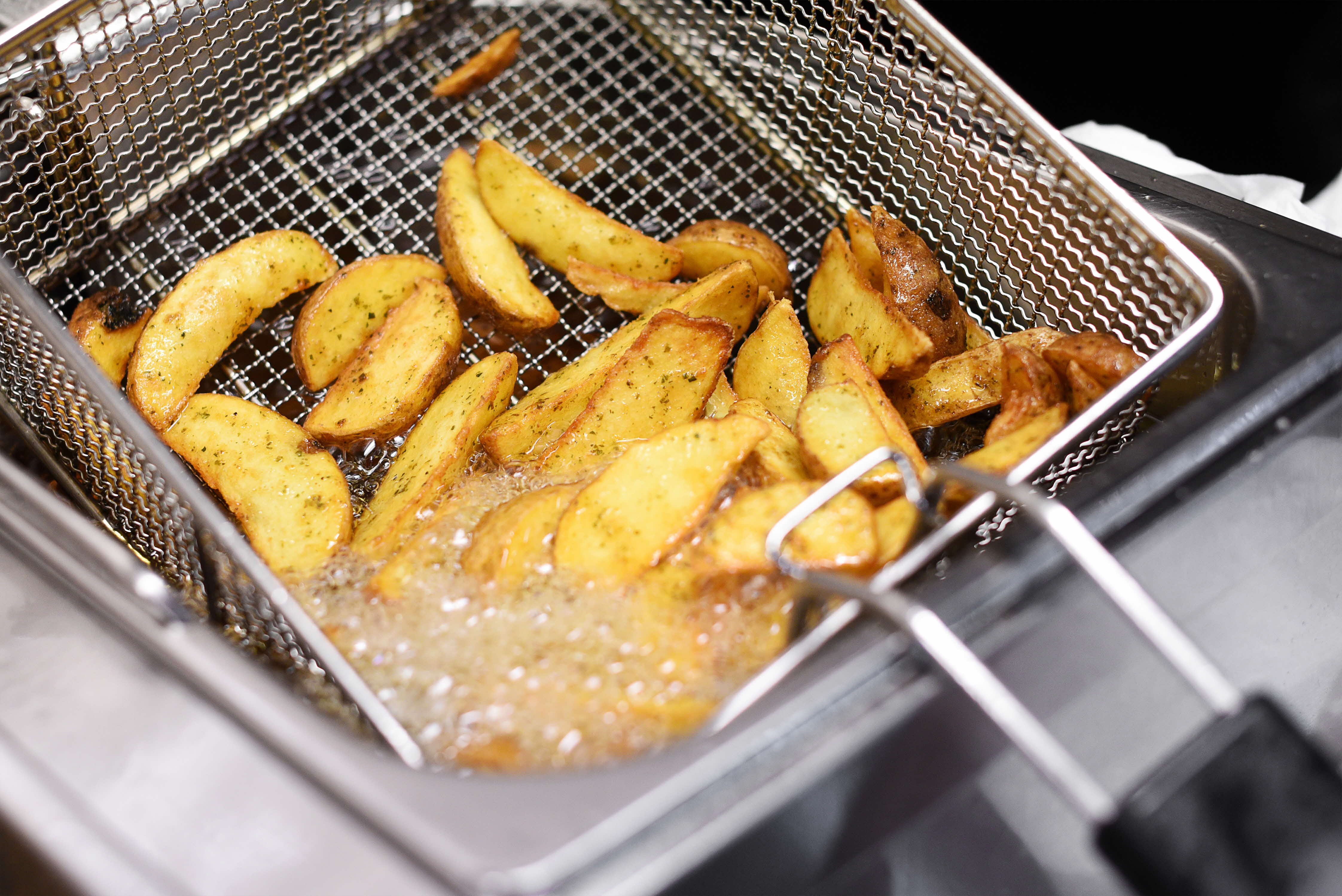
Researchers at work on a feed facility at the Marine Aquaculture Centre
Given our history as a fishing village, one may think that many of Singapore’s fish and seafood farmers today still ply their trade using simple fishing nets. That might have been the case for an early colonial population of 10,000. However, as a modern trading hub with more than 5.8 million residents each consuming about 16kg of fish and 6kg of seafood per year, Singapore can no longer rely on traditional means of fishing and aquaculture to meet our needs.
Currently, about 10 percent of the fish we consume comes from local farms. To grow our capability and capacity to grow more, the aquaculture sector needs to overcome Singapore’s resource constraints by transforming and adopting technology to raise productivity. At the same time, the sector needs to strengthen its resilience against climate changes while ensuring the sustainability of our environment and viability of the sector.
Many industries face space constraints, and aquaculture is no exception. While aquaculture can be conducted on land and sea, there are diverse and competing needs for both spaces. For example, most of the sea space within our port limits is being used by the maritime and port industry as navigational channels or anchorages, which are important contributors to our economy. Aside from port use, our limited sea space is also used for a variety of purposes, including aquaculture, industry, utilities, and recreation. There’s also the need to protect the marine biodiversity of our waters.
It is critical that we optimise the allocated space for aquaculture. One way to do so is to embrace technology and adopt productive and sustainable practices.

Jade perch farmed within the tanks in an enclosed environment. These tanks are connected by a Recirculating Aquaculture System developed by the farm Blue Ocean Aquaculture Technology (BOAT).
Several local farms have already done so, by leveraging technology and innovation to farm its fishes indoors. On land, Blue Ocean Aquaculture Technology (BOAT) developed a factory-based indoor farming system using recirculating aquaculture system (RAS) that allows it to maximise its space for farming of jade perch.
With growing concern on the impact of climate change on aquaculture and greater focus on environmental sustainability, the Aquaculture Centre of Excellence (ACE) developed a floating closed-containment system to protect fish from adverse environmental conditions, improve fish health and disease management, reduce environmental impact and increase productivity.

EcoArk, an example of a floating closed-containment system that protects fish from adverse environmental conditions and raises productivity.
The latest generation of a floating closed containment system in Singapore was developed by EcoArk, with co-funding support from SFA. It is purpose-built and incorporates high-tech features including the RAS and green energy solutions to power the farm. Fishes are kept in tanks and isolated from the external environment, while solid waste is removed before the water is discharged into the sea.
Productive and sustainable technology requires significant investment. To help coastal fish farms better plan for such investments and unlock the full potential of the sea space, SFA is exploring the use of lease instruments and longer leases to provide farms with greater certainty on the use of the sea space allocated to them.
R&D: A key enabler to becoming a tropical aquaculture technology hub
Beyond technology, R&D is a critical enabler to transform our aquaculture sector. Despite Singapore being a small aquaculture producer, there is a vibrant aquaculture R&D ecosystem here.
SFA’s Marine Aquaculture Centre (MAC) conducts R&D on hatchery technology, aquaculture nutrition and aquatic husbandry for tropical marine species. Research institutes, universities, and polytechnics in Singapore are also looking into ways to test new technologies and address the needs of local fish farms by working with MAC. Located on St. John’s Island, MAC seeks to enable and partner farmers by providing science-based husbandry-related expertise, shared facilities, and access to biological materials for researchers in Singapore to conduct aquaculture R&D and facilitate the transfer of technology to farmers.

SFA’s Marine Aquaculture Centre (MAC) spearheads tropical aquaculture development.
For example, MAC collaborated with Temasek Life Sciences Laboratory to successfully develop superior lines of Asian seabass with desirable traits such as fast growth, disease resistance, and high nutritional value. This was spun-off into an aqua-tech start-up Allegro Aqua in 2018 to scale up the production of the higher quality strain of the Asian seabass. In early 2020, Allegro Aqua was acquired by local farm Barramundi Asia to vertically integrate with its operations and enhance their technology and production.
MAC is also one of the founding members of the Aquaculture Innovation Centre (AIC), which aims to enable greater collaboration among government agencies, academic institutions and industry. Members can pool resources and expertise to conduct research, training and services for the aquaculture industry. They can also tap on MAC’s various R&D facilities such as a feed mill and experimental tank system that support research on tropical marine species.
In addition, industry players can tap on the Singapore Food Story R&D Programme grant call to research and develop solutions to address challenges facing tropical aquaculture. One of the areas funded under this programme includes a grant call for innovative solutions for tropical aquaculture, with a focus on genetics, nutrition and disease, and health management. So far, about $23m has been awarded to eight proposals in the domain of sustainable urban aquaculture. The projects will look into key research areas such as improving genetics of tropical marine species, smart aquaculture systems and optimising conditions for increased productivity and efficiency.
R&D: Key to the future of food
A recent report by the FAO highlighted the impact of climate change on aquaculture, which includes production losses due to increased risk of diseases and harmful algal blooms, as well as long-term challenges such as scarcity of wild-caught fingerlings and fishmeal for aquafeeds. SFA believes that R&D, coupled with productive, sustainable agri-tech, holds the key to the future of food as we tackle climate change challenges.
SFA has been conducting studies on local aquaculture to unlock the full potential of sustainable sea-based farming. Our studies found that a higher level of fish production can be supported sustainably in Singapore’s waters, if appropriate farming practices are used.
For example, farms could adopt more sustainable sea-based farming management methods and measures (such as the use of pelleted feed, and adoption of closed-containment technologies) to reduce the impact of farming activities on farm site conditions. This will boost the productivity (e.g. lower mortality of fish) and resilience of the farm and ensure that our sea space is not degraded over time. In the long term, sustainable practices and systems will help sea-based fish farms enhance their capability and capacity to grow more with less.
Farms can also tap on SFA’s $60 million Agri-Food Cluster Transformation (ACT) Fund to adopt sustainable technology and systems to be more productive, climate-resilient and sustainable.
Through innovation, R&D, and a close partnership among government, academia and industry, Singapore has the potential to become a hub for tropical marine aquaculture technology. This will translate to greater food security for Singapore and more business opportunities for the aquaculture industry in the long term.



